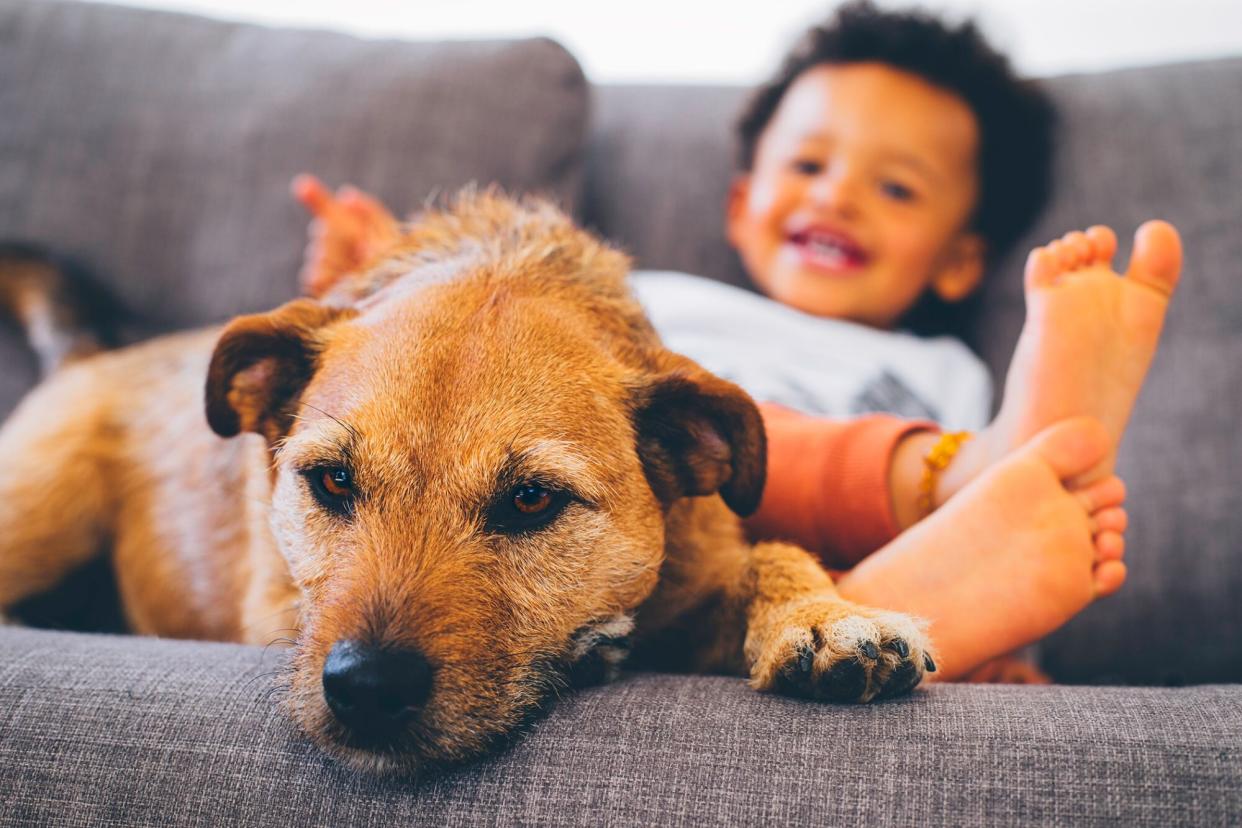Growing Up With a Dog Can Can Be Good for Children's Health and Happiness, Studies Find

SolStock / Getty
At all stages of our lives, pets fill vastly different roles. While companionship may be the underlying reason for living with animals, they can have a greater, more specific impact—especially for kids.
In fact, scientists frequently examine how growing up with a dog can be good for children in numerous ways. To help explain why, we asked the team at the Human-Animal Bond Research Institute (HABRI) for additional insight.
The Benefits of Having a Dog
HABRI notes that a wide range of studies demonstrate how pet ownership can improve mental health and wellbeing in children. Specifically:
Attachment to pets can promote healthy social development, social competence, increased social interaction, improved social communication, and social play in children.
Childhood pets can be perceived to be nonjudgmental, confidential, and accepting sources of support.
Pets can be perceived as presenting their feelings authentically in the moment and being more forgiving than humans.
"Researchers theorize that pet dogs are effective at buffering stress in children because they offer a non-judgmental source of companionship," HABRI researchers tell Daily Paws. The organization co-funded a study at Yale University regarding whether interactions with pet dogs can improve symptoms of stress in children. The conclusion? "Following exposure to a stress test, researchers found that brief, unstructured interactions with dogs boosted children's positive emotions and reduced anxiety."
RELATED: The 12 Best Small Family Dogs Ready to Join Your Pack
Why Children and Pets Are Better Together
Led by HABRI, American Humane, and the Pet Care Trust, a groundbreaking study regarding pets in the classroom (ranging from dogs and guinea pigs to reptiles and fish) determined that their presence may provide some positive effects for children in third and fourth grade, such as improving social skills and academic reading competence. Class pets may also decrease select problem behaviors in the classroom, including hyperactivity and inattention.
"Overall, these results suggest that animals may enrich learning environments in meaningful and diverse ways, which could have broad developmental implications for children, perhaps especially for those who are socially withdrawn," the HABRI team says. "Research has also found that the presence of a dog in the classroom can also improve social skills in children."
Today, through the initiative Pets in the Classroom, teachers consistently observe the development of "sympathy, empathy, responsibility, compassion for living things, [and] loving caretaking" in children's interactions with classroom pets. Since 2010, the program has impacted more than 8 million children throughout the U.S. as of 2022.
RELATED: Meet Lucky, the 3-Legged Puppy Who Became a Therapy Dog for Schoolchildren
But the benefits of having a pet aren't limited to the classroom. Researchers at the Telethon Kids Institute and The University of Western Australia (UWA) investigated whether active play and walking with the family dog facilitates improved health and developmental outcomes in young children using data from the comprehensive Western Australian "Play Spaces and Environments for Children's Physical Activity" (PLAYCE) Study.
"Findings indicate that dog-owning children had better socio-emotional outcomes compared to non-dog-owners, and that dog ownership is positively associated with physical activity in preschool-aged children," according to the HABRI team.
Additionally, HABRI has funded research into studies regarding the relationship between pets and children with autism spectrum disorder (ASD). "A pet dog with a child with autism found significant reductions in family difficulties and in parental stress over the long-term," HABRI states. "The results illustrate that dog ownership is associated with enduring improvements to family functioning and may also help alleviate domains of parenting stress associated."
Some positive preliminary results have been released involving children with ASD and shelter cats, too.
Growing Up With a Dog Fosters Care and Responsibility
Bonding with a dog establishes an amazing relationship for all involved, but what's even more interesting is just how in-tune dogs are with kids.
For example, animal behaviorists at Oregon State University studied the behavior of dogs mimicking the movements of their child companions—and 60 percent of the time, they were completely in sync, even more so than with adults. Researchers reported "the great news is that this study suggests dogs are paying a lot of attention to the kids that they live with…and children are very capable of training pet dogs, and that dogs are willing to learn from them." This means kids can take the lead on certain chores, such as walking, feeding, and picking up after a pooch, too.
RELATED: 12 Great Dogs That Make Instant Playmates for Kids
However, the experts at HABRI emphasize that adding a dog to the family is an important decision that parents should consider carefully based on the advice of experts in pet care and pet health. "While the human-animal bond can be incredibly rewarding and beneficial for children and families, pet dogs are a big commitment."
Before you adopt, take time to familiarize yourself with the costs of owning a dog, as well as certain lifestyle considerations such as how much time you and your kids have to see to a pup's daily needs such as exercise and other enrichment activities. Also consider how you'll help a new pet adapt to the household with proper socialization and positive reinforcement training.
Another way to introduce your children to the joys and responsibilities of a friendly four-pawed pal is by partnering with a shelter or rescue to foster a dog first. There are many special programs that help families do this on a short-term basis. You're both saving an animal's life by helping them acclimate to a home environment and teaching your kids about what it's like to have a furry friend. And who knows? This pup might be the one you make forever memories with after all!

